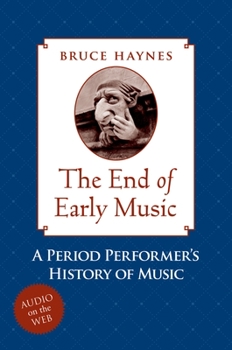The End of Early Music: A Period Performer's History of Music for the Twenty-First Century
Part history, part explanation of early music, this book also plays devil's advocate, criticizing current practices and urging experimentation. Haynes, a veteran of the movement, describes a vision of the future that involves improvisation, rhetorical expression, and composition.
Format:Hardcover
Language:English
ISBN:0195189876
ISBN13:9780195189872
Release Date:July 2007
Publisher:Oxford University Press
Length:304 Pages
Weight:1.25 lbs.
Dimensions:1.0" x 6.4" x 9.5"
Customer Reviews
4 ratings
The Philosophy Behind HIP
Published by Thriftbooks.com User , 15 years ago
Bruce Haynes' THE END OF EARLY MUSIC is a book about the historical performance movement, its aims and philosophy and its place in the modern musical scene. Haynes traces HIP (historically informed performance) in history, contrasting its philosophy with the romantic mindset which preceded it (which included the notions of absolute music, canonism, and the "transparent performer"). But Haynes' book is not simply a polemic against "mainstream" (i.e. non-historically informed) ways of performing older music; he outlines and critiques different trends within HIP itself, coming down squarely on the side of what he calls the Eloquent Style, a "passionate oratorical manner...based on declamation and gestural phrasing". Part I of the book is brilliant. Haynes outlines what he discerns as the three successive styles of playing early music in the 20th century. The grand romantic manner, with its swooping portamento and rhythmic liberties, was a carry-over from the previous century. In reaction to this, and influenced by the "objectivist" aesthetic of Stravinsky, a new "Modernist" style developed in the 1930's that was extremely precise, literalistic, and emotionally detached (this is the Academy of St. Martin-in-the-Fields variety of baroque performance). This style, stiff, mechanical, lacking in inflection, was far worse than Romantic Baroque; Haynes considers it an analogue to the mechanized standardization of the Industrial Revolution. The 1960's saw the beginnings of the Period Style which is now practiced by HIP musicians all over the world. Haynes further divides Period Style into two trends -Straight Style (or "Modern Lite", as he calls it), and the Eloquent Style, which Haynes feels represents the true baroque aesthetic. As a historical performance student and performer, I am in fundamental agreement with Haynes' ideas, even if I have quibbles with certain particulars. Although the book has "early music" in the title, it is pretty much limited to baroque music, Haynes' area of specialization; Haynes does not make it clear how much of what he says is also applicable to Renaissance or Classical music. Moreover, it is hardly a "history of music", as the subtitle proclaims, but rather a history of musical interpretation from the romantic era to the present with the baroque era as the point of reference. At times Haynes could have chosen his words better. As a Catholic, I was dismayed by the language he used in comparing the romantic concert to religious ritual in the chapter "Classical Music's Coarse Caress": "Music of this type thus risks becoming liturgy, UNTHINKING AND UNPROVOCATIVE [my emphasis]...Ritual actions are those that, because they are often repeated, lose the meaning they once possessed, and become automatic". I don't know what Haynes' religious convictions are, but he should have chosen his words more carefully here so as not to offend. Haynes seems unwilling to give the 19th century any credit whatsoever, and o
Secrets of interpretation.
Published by Thriftbooks.com User , 15 years ago
A provoking book which should be read by all practising musicians. It is also accessable to the general music lover who is interested in the nature, history and development of musical interpretation, mainly through the copious musical examples which are not simply printed. They can be accessed and heard through internet links. How and why do 'schools' of musical interpretation develop over a period and then transform into something different? You will be left thinking about this and other related topics when you have read and absorbed this book.Julian Mincham
The Future of the Past....
Published by Thriftbooks.com User , 16 years ago
Bruce Haynes has created a great book for those wishing to have a further understanding of not only what made baroque music "tick" in its own day, but what efforts are being made to keep it ticking today. His efforts to show how we are still searching for how baroque musicians actually thought about and played the music of their time through the hazy mist of Romanticism and modernism is an eye opener, right down to the unruly audiences at operas and the cheers during pieces while being played. Also the high degree of improvisation which was required for many pieces for them to truly take off as they were originally meant to. Plus, near and dear to my heart is the section on modern period composition and the mention of Vox Saeculorum, a modern guild for period composers. The future of "early" music is definitely moving forward, probably in ways that many have never dreamt of....
Superb! Thought-provoking
Published by Thriftbooks.com User , 17 years ago
Bruce Haynes latest book "The End of Early Music" is superb, and applicable to those of us in the Period music field, as well as to all classical musicians and classical music organization administrators. As we all struggle for audience and relevance, this book can provide context and challenge. Recommended without any reservation.





